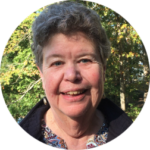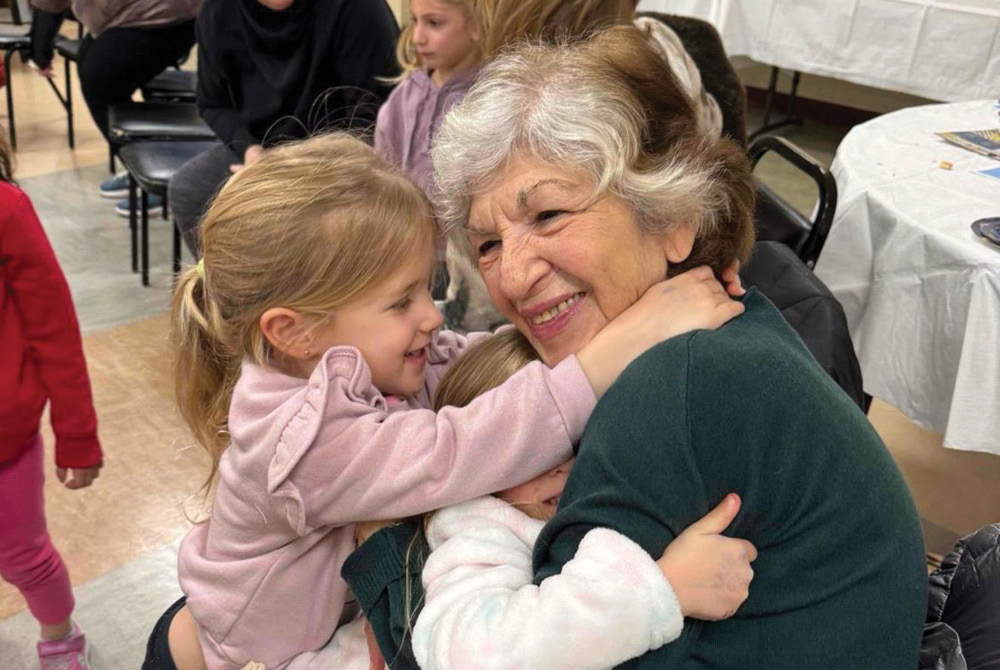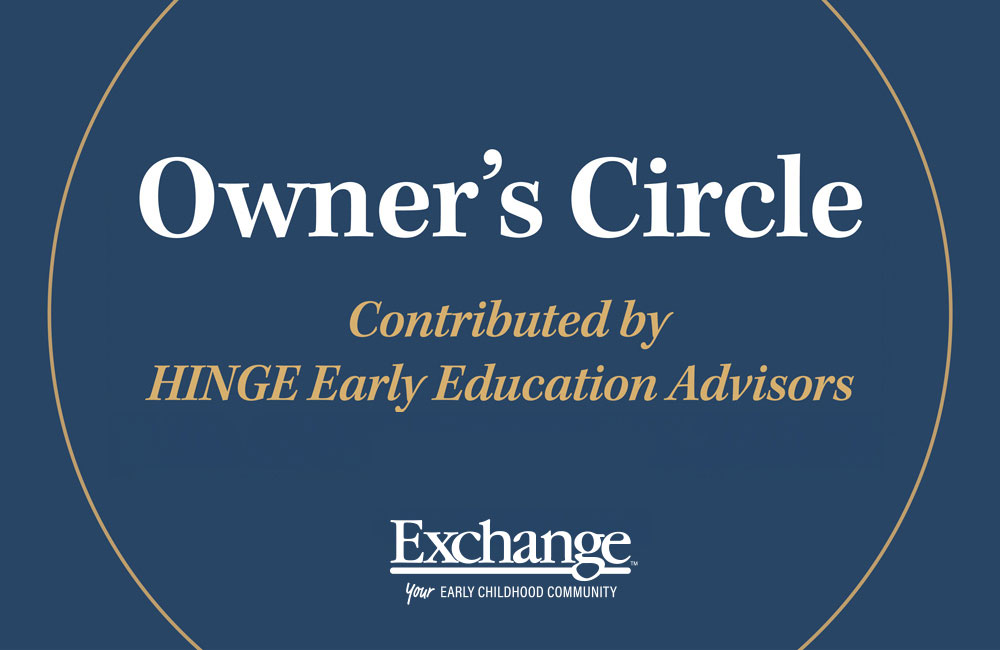Through the Exchange Leadership Initiative, Exchange has been making leadership more visible in the field of early care and education since 2014. Now with more than 450 Exchange Leaders, we see them everywhere—as directors, owners, and administrators, in classrooms, family child care homes, schools, colleges, and universities, and in all the programs and services that support children and families. As leaders, they provide vision and stability, imagination and caring, and through their actions they offer direction now and into the future.
This year has brought more challenges and opportunities. We are, at once, exhausted and exhilarated as we welcome the summons to the demanding task of providing excellent care for our youngest children and their families during these turbulent times. The need for leadership throughout our field continues to be high, and our Exchange Leaders have stepped up and moved forward in response. Thank you to all our leaders and to all of us who follow. Together, we work to sustain families and communities through our supportive services.
With congratulations and delight, we invite you to meet your new Exchange Leaders for 2022.
Exchange Leaders thoroughly understand early care and education principles and practices, address diversity and equity, and are engaged in lifelong learning. They are grounded in their own work and are using their strengths and skills to make a difference for children, families, and their communities.
We asked applicants to share their passion for the field, and to tell us stories about their leadership journey. Here are their inspiring answers.
 Samantha Balch
Samantha Balch
HONOLULU, HAWAII
Educator, The Early School
What is your personal mantra that is important to your leadership?
When faced with any kind of issue, I have found the mantra “choose curiosity over judgement” has had an immensely positive impact on my leadership. It allows me the chance to slow down and see people as full human beings, with their own ideas and perceptions, and gives me the chance to reflect on systems or traditions that might be impacting the situation. To embrace this level of vulnerability with each other and allow for communication that is open, honest, and unafraid has led to my growth as a more compassionate leader.
When did you realize that you were a leader? How did you embrace the pride and the willingness to self-identify as a leader?
My director stopped me and said, “You know, since our doors are open, I hear you when you are with the children—I hear the way you talk to them and encourage their thinking. You do it really well.” I was stunned and humbled that she took the time to listen to me with the children, when my position often felt like an afterthought to the “real” school day; I was encouraged that my priorities when working with children were respected, and it made me hungry to learn more and keep getting even better. It was such a small moment—one that cost my director no money or time—but has made me so aware of how these positive interactions can change someone’s day, year, or even life.
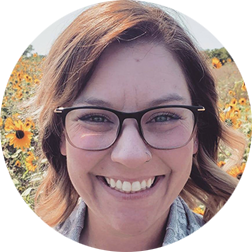 Julia Bardsley
Julia Bardsley
FORT RILEY, KANSAS
Owner/provider, Play Platoon
In 2015, new military regulations were imposed that shut down my program, due to no fault of my own. I completed the necessary paperwork, but the security office responsible for handling my background checks lost my documents—not once, not twice, but three times. Because my paperwork was not processed in time, I lost a month’s income. Feeling helpless, but not one to idly sit by, I wrote a letter to my senator, congressional representative, and the secretary of the Army. One quiet Friday evening, I received a phone call from the chief of security for the Army and spent the next few hours outlining all of the ways the system had failed me. Fortunately, or rather unfortunately, I was informed that I by far had the worst experience with the new system, but I was able to prevent this from happening to others. That was when I discovered I had the motivation and ability to advocate for myself and others. I became a key stakeholder in military policy as it pertains to Army family child care providers, in addressing policies that directly affect the process of our small businesses.
 Jennifer Blohm
Jennifer Blohm
GLASSER, NEW JERSEY
Technical Assistance Specialist, CJFHC
What is your vision for what needs to happen in early care and education? What needs to change to achieve the vision?
My vision, and personal goal, is to help all early childhood educators understand that they are professionals. Change happens within, but helping others understand their true value over time will help to change the world. It is when a person views themselves as a professional that their achievements and quality of teaching flourish—providing a better foundation and quality of learning for their students, who will one day be the leaders of this world!
When did you realize that you were a leader? How did you embrace the pride and the willingness to self-identify as a leader?

Lauren Bond
BOWIE, MARYLAND
President and founder, Bond Education Services & Training, LLC
What is your personal mantra that is important to your leadership?
As I go through doors of opportunity, I want to ensure that I leave the door open behind me, with a welcome mat for other leaders to join me. I am a firm believer in networking and collaborating with professionals who have the same passion for young children and their families as I do. I recognize that others have left the door open for me and have provided me opportunities to challenge myself to do things that I have never done before. As a result of those opportunities, I have grown as a professional and a leader within the field of early education. I am committed to empowering and equipping educators and leaders. It brings me joy to see others win and reach their goals. If we all work together to support each other, we can have a positive impact and ensure that the early childhood education profession is seen as a profession of excellence.
ADVERTISEMENT
 Lisa Taylor Cook
Lisa Taylor Cook
MIDLOTHIAN, TEXAS
Assistant professor,
Tarleton State University
When did you realize that you were a leader? How did you embrace the pride and the willingness to self-identify as a leader?
In the last five years, I started to realize that I am a leader and have begun to embrace this responsibility more. I previously had not viewed myself as a leader, but rather as a supportive team member. Through the encouragement of others, I realized that I do have the skills to lead and have begun identifying myself as a leader. The pride I have as a leader is continually renewed when I see those who I have assisted achieve new things within their programs and professional fields.
 Jeremy Daly-Griffen
Jeremy Daly-Griffen
SOUTH DAYTON, NEW YORK
UPK teacher, Pine Valley
Elementary School
What is your passion in the field of early care and education? Why?
I bring music and movement every day to the students using my guitar as a teaching vessel. All students experience success academically while being engaged musically and physically. When given these opportunities, all students can succeed.
 Denise Fadina
Denise Fadina
BROOKLYN CENTER, MINNESOTA
Owner/primary provider,
Bright Future Child Care
What is your passion in the field of early care and education? Why?
My passion in the field of early care and education is to find ways to support child care providers to continue the work of cultivating the brilliance in children. I feel strongly that many amazing providers and educators come into the field of care and education excited and giving their all, but many leave due to the adverse work environments, low wages, and lack of support from the government.
I am certain that we can make the work of a provider and educator more rewarding and more appealing for those that could make a huge difference in the lives of many children. If we do not speak out on this and bring attention to the working conditions of child care workers and educators, I know our society as a whole will be greatly affected.
 Aviva Fudem
Aviva Fudem
THORNHILL, ONTARIO, CANADA
Owner, freelance educator,
idea architect, ThinkinEd
What is your personal mantra that is important to your leadership?
“If you change nothing, nothing will change.”
I cannot wait around for change to magically materialize before my eyes, or expect others to change for me. I must take action and take ownership of the things others should never own: my journey, my emotions, my behaviour, my wellbeing, my story.
 Nicolette Graf
Nicolette Graf
APPLE VALLEY, MINNESOTA
Equity and advocacy coordinator,
Child Care Aware Minnesota
What is your vision for what needs to happen in early care and education? What needs to change to achieve the vision?
When it comes to advocacy, I like to think this: in the history of our country, we have a lot of “isms” (racism, sexism, etc.) but the least practiced is activism. Not because we do not want to, but because we do not have innate skills to stand up for ourselves and what we believe in. Advocacy can be taught and learned. To me, that is exactly what our field needs. We need the ability to say, “This is what I need,” “This is what my children need,” “This is what our community needs.” Once we are all grounded in our power, man, we could do big things.

Corrine Hendrickson
NEW GLARUS, WISCONSIN
Family child care provider,
Corrine’s Little Explorers
What is your vision for what needs to happen in early care and education?
What needs to change to achieve the vision?
My vision for what needs to happen is fully funded universal child care. Our society and culture need to understand that children and families are not an “individual responsibility,” but a collective responsibility and investment; that communities thrive when people are prioritized, and that educators are professional, knowledgeable, and deserve to be compensated as such. But the only way any of that can happen for every child/family is to invest in child care as a public good. Currently, the system relies on those willing to sacrifice their own financial, emotional, and physical well-being to be early childhood educators, while parents sacrifice their own financial stability to pay for care.
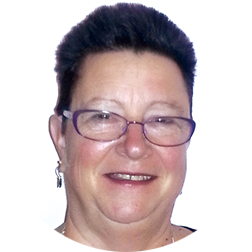 Kristen Wheeler Highland
Kristen Wheeler Highland
MINNEAPOLIS, MINNESOTA
Licensing compliance, professional development, community child care partner support coordinator, Community Action Partnership of Ramsey/Washington County
What is your personal mantra that is important to your leadership?
“Before you are a leader, success is all about growing yourself. When you become a leader, success is all about growing others.” —Jack Welch
Growing up, both of my parents held management positions. I believe that their examples informed my approach. Within my personal mantra, there are two strong themes: I believe in supporting and growing people to achieve the positions that they have the drive and dream to achieve. At some points in my career, that meant supporting a staff person to leave our organization in order to go for and achieve their next step, or their dream. I believe that strengthening leadership in our field and moving it forward requires strong, passionate leaders.
“Leadership is not an expertise. Leadership is a constant education.”
—Simon Sinek
The second theme comes from a phrase that has always bothered me: “Because we have always done it that way.” There is strong history and foundation in our field, so there is reason to continue in the same practices and traditions; however, we also need to be reflective and intentional. We have the opportunity to do more when we know more. Reflecting on our practices and being intentional can guide us to continue strong practices and to add or adapt other practices.
 Tracey Hoffman
Tracey Hoffman
MIDDLETOWN, OHIO
Associate professor, pre-kindergarten coordinator, Miami University
What is your vision for what needs to happen in early care and education? What needs to change to achieve the vision?
In general, my vision would be for the field to receive more respect, and for teachers to be seen as professionals in child care. Many child care teachers are viewed as “babysitters” and are not always shown the respect they deserve. As a society, many do not value those individuals who work with and care for our youngest children. Child care and preschool teachers are experts in child development, and devote their days to educating young children. There is much valuable research on the significant impact that attachment plays in children’s lives. During the early years, the attachment process is crucial to a child’s healthy development.
I realize that this is a big step, but I strive to infuse the value and importance of early care (and the years from birth to 5 years old) in my courses and conversations with students.
 Stephanie Kelley
Stephanie Kelley
ASHEVILLE, NORTH CAROLINA
Center director, Verner Center for Early Learning
Tell us a story about a person (or group) that made a key difference for you in your decision to be a leader.
I met “J” as a 2-day-old infant who was born to a biological mom who struggled with substance use disorder and was placed in the care of her foster moms (who also had a biological sibling of hers in their care already). She enrolled in my classroom as an infant and taught me about love, patience, selflessness, compassion, and how to live life unafraid of what may come. She is now a thriving 4-year-old who I still keep in regular contact with, because we bonded and fell in love from the moment we met.
 Mindi Leiber
Mindi Leiber
HUNTINGDON VALLEY, PENNSYLVANIA
PHL pre-K coach, Spark Quality Support Center
Tell us a story about a person (or group) that made a key difference for you in your decision to be a leader.
While teaching, the class was having a typical discussion during lunch. It was the beginning of the week and we were discussing the weekend. I had one child who stated as a matter of fact that he visited his father in jail and “talked to him on the television screen.” This was the first time I had heard something like this from any family. It helped me take a step back and think about the way I viewed this child’s work, progress, and behavior. I still think of him whenever I support teachers who are challenged by a child.
 Victoria Long-Coleman
Victoria Long-Coleman
DACULA, GEORGIA
Early care and education specialist, Quality Care for Children
How have you used your leadership to make a difference for children and families beyond your program or position?
As I thought about the question and reflected on my 46 years as an educator and advocate in early care and education, I could not distinguish the excerpt “beyond your program or position” from my life because leadership to make a difference for children and families has been my life. I grew up working in my family’s child care center during the 1960’s, a time when Black children and families relied on the trust and safety found in neighborhood networks of home-based child care programs. My family’s leadership served the community and sparked my interest of a career in ECE.
Most recently, contributions beyond my position as an ECE Specialist have centered on ECE research and participation in boards, committees, and projects at community, state, and national levels. I choose organizations whose missions advocate and promote structures that prepare, develop, and support early childhood professionals and further the ECE field. By supporting early childhood professionals, ultimately my leadership leads to improved outcomes for children and families.
 Liane Martinez
Liane Martinez
DENVER, COLORADO
School readiness and disabilities director, Denver Great Kids Head Start
Tell us about a key moment that influenced your leadership.
In my own education and career, I noticed that many of the higher paid personnel in schools did not look like me or live in the community served. I was determined to be that person for others. It was not easy to be a first-generation college graduate with a family to raise, but I wanted to be an example for the community, my children, and other minority teacher assistants, to model that they, too, could be teachers or coaches or administrators. I took classes alongside many, and was able to encourage or coach them on their journeys. And when they moved on to obtain a degree or center director license or coach position, this made me so proud and encouraged me to continue this work.
 Helen Meissner
Helen Meissner
MINNEAPOLIS, MINNESOTA
Lead kindergarten readiness teacher, Stepping Stones ELC
What is your personal mantra that is important to your leadership?
You can only be a good educator if you are willing to continue to grow and learn yourself, even if it means exploring new philosophies that go against the norm in mainstream education.
We need to stop pushing children to excel in areas they are not yet developmentally ready for and return to allowing movement, play, and creativity to be a part of their younger years. We need to move away from worksheets and long periods of static learning for children 5 and under, and return to things that bring joy, fulfill natural physical development stages, and inspire children to be curious and learn.
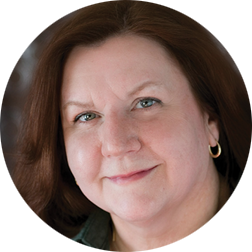 Karen Nemeth
Karen Nemeth
ALLENTOWN, PENNSYLVANIA
Author/Consultant,
Language Castle, LLC
Tell us about a key moment that influenced your leadership.
A key moment in my leadership journey happened when Exchange magazine published my very first article, “Conversations: The Tie that Binds our Work,” in 2018. Donna Rafanello mentored me during that process, where I learned that I could be a writer and I could influence early childhood education broadly.
 Trinette Potts
Trinette Potts
MINNEAPOLIS, MINNESOTA
Professional development specialist, Child Care Solution and Youth Development of Minnesota
Tell us a story about a person (or group) that made a key difference for you in your decision to be a leader.
The person that made a key difference in my decision to be a leader was my mentor. She and I met for one of our mentoring sessions, and she began to tell me of the qualities that she saw in me. It was so impactful that I had to go home and do some soul searching, because at that moment, I realized that she saw greatness in me that I had not realized. I was so busy being busy, learning, and serving others that I had not stopped to take inventory of all that I had gained and accomplished.
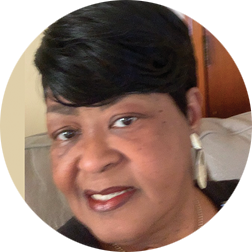 Terri Robinson
Terri Robinson
FORT PIERCE, FLORIDA
Pre-kindergarten team leader teacher, Palm Beach School District
As a leader, it is important to access a “seat at the table.” At what “tables” have you claimed a seat? How did you achieve your seat?
The day I walked into a Head Start program and observed how parents, children, teachers, and case managers interact, I was able to use my prior knowledge as a case manager and link self-sufficiency to service for the whole child. I knew as an educator I could act as a catalyst to service and improve outcomes. I have claimed a seat at the table of many school readiness initiatives that serve the whole child. Local collaboration, community/resident groups, and providers select a goal and objectives and develop strategic plans of action.
 Patricia Ruas
Patricia Ruas
SEATTLE, WASHINGTON
Mentor teacher,
Hilltop Children’s Center
How have you used your leadership?
I have found myself in moments where I had a decision to make, where the crux of the problem was to take a stand for justice, or to give support to someone in need.
It was how I chose to proceed in those moments that made me realize how much investment I have in the lives of the children, families, and people that work alongside me, and how much I care about the impact I have, not only my intent to do better. I have used my voice to facilitate trainings, give presentations, and participate in podcasts, and I have written articles to illustrate and challenge not only educators, but also other people into having hard conversations together about the importance of early education, as well as the intersection of early education and social justice.
 Ashlee Saro
Ashlee Saro
ROSELLE, NEW JERSEY
Technical assistance specialist, Central Jersey Family Health Consortium
What is your personal mantra that is important to your leadership?
“Your voice is your currency.” This mantra has led me to remember my voice and my words will not only help me inwardly, but also help others when needed.
 Shannon Tremblay
Shannon Tremblay
PORTSMOUTH, NEW HAMPSHIRE
Center director, Little Blessings Child Care
What is your vision for what needs to happen in early care and education? What needs to change to achieve the vision?
My vision for early care and education is all about equality and recognition of the incredible workforce that we have! Early childhood educators have worked so hard for so many years in order to gain the recognition that we deserve. It was not until the COVID-19 pandemic that we were thrust into the “essential worker” light. Our field and our colleagues took this and ran with it, never once backing down or shuttering our doors. We remained open and operational for the families that we serve and we did it with pride. It is time for our field to be recognized as the professionals we are, and for our hard work and dedication we illustrate every day we step foot into our centers!
We have also found our workforce diminishing, with high school and undergraduate programs being underfunded and shutting down. We need to rebuild those pipelines, rebuild the workforce, and retain the amazing, talented, caring teachers that we have. Rebuilding the workforce and implementing a system where teachers are paid a livable wage will happen in my lifetime!!!
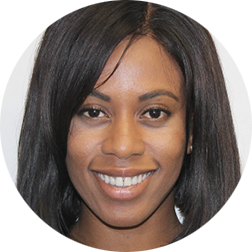 Jennice Webb
Jennice Webb
HALEDON, NEW JERSEY
Education director, The Salvation Army
How have you used your leadership?
When I think of a leader, I think of someone proactive. As a leader, I am committed to being a force of change and understanding the needs of those I serve. Being an agent of change starts with listening; listening to families’ struggles tell a story that cannot fall on deaf ears. Making a difference goes beyond the classroom. It is a daily mindset a leader must choose, regardless of how they feel. In my position, I work with many child care directors. I encourage them to listen to families as they express their needs and collaborate with other programs, departments, and colleagues to help meet those needs.
Pam Boulton, Ed.D., is coordinator for the Exchange Leadership Initiative for Exchange magazine and is an instructor for the Center for Early Childhood Professional Development and Leadership in the University Wisconsin-Whitewater Department of Continuing Education. She focuses on leadership development in the early childhood field.
Related
ADVERTISEMENT






